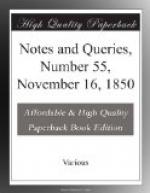L.
Gospel Oak Tree at Kentish Town.—Can you inform me why an ancient oak tree, in a field at Kentish Town, is called the “Gospel Oak Tree.” It is situated and grows in the field called the “Gospel Oak Field,” Kentish Town, St. Pancras, Middlesex. Tradition says Saint Augustine, or one of the ancient Fathers of the Church, preached under its branches.
STEPHEN.
Arminian Nunnery in Huntingdonshire.—Where can I find an account of a religious academy called the Arminian Nunnery, founded by the family of the FERRARS, at Little Gidding in Huntingdonshire? I have seen some MS. collections of Francis Peck on the subject, but they are formed in a bad spirit. Has not Thomas Hearne left us something about this institution?
EDWARD F. RIMBAULT.
Ruding’s Annotated Langbaine.—Can any of your readers inform me who possesses the copy of Langbaine’s Account of the English Dramatic Poets with MS. additions, and copious continuations, by the REV. ROGERS RUDING? In one of his notes, speaking of the Garrick collection of old plays, that industrious antiquary observes:
“This noble collection has lately (1784) been mutilated by tearing out such single plays as were duplicates to others in the Sloane Library. The folio editions of Shakespeare, Beaumont and Fletcher, and Jonson, have likewise been taken from it for the same reason.”
This is a sad complaint against the Museum authorities of former times.
EDWARD F. RIMBAULT.
Mrs. Tempest.—Can any of your correspondents give me any account of Mrs. (or, in our present style, Miss) Tempest, a young lady who died the day of the great storm in Nov., 1703, in honour of whom Pope’s early friend Walshe wrote an elegiac pastoral, and invited Pope to give his “winter” pastoral “a turn to her memory.” In the note on Pope’s pastoral it is said that “she was of an ancient family in Yorkshire, and admired by Walshe.” I have elsewhere read of her as “the celebrated Mrs. Tempest;” but I know of no other celebrity than that conferred by Walshe’s pastoral; for Pope’s has no special allusion to her.
C.
Sitting cross-legged.—In an alliterative poem on Fortune (Reliquiae Antiquae, ii. p. 9.), written early in the fifteenth century, are the following lines:—
“Sitte, I say, and sethe on a semeli sete, Rygth on the rounde, on the rennyng ryng; Caste kne over kne, as a kynge kete, Comely clothed in a cope, crouned as a kyng.”
The third line seems to illustrate those early illuminations in which kings and great personages are represented as sitting cross-legged. There are numerous examples of the A.-S. period. Was it {408} merely assumption of dignity, or was it not rather intended to ward off any evil influence which might affect the king whilst sitting, in his state? That this was a consideration of weight we learn from the passage in Bede, in which Ethelbert is described as receiving Augustine in the open air:




